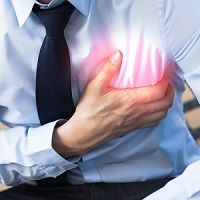Flu Vaccination Linked to Lower Heart Attack Risk
Patients who received a flu shot had a lower rate of myocardial infarction, according to new research.

The primary goal of the influenza vaccine is to prevent flu infections, but a new study finds it can also help prevent another serious medical situation: heart attack.
New research shows the risk of myocardial infarction is lower in patients who have been vaccinated against the flu. The data adds another dimension to the case for getting a flu shot.
Previous research has suggested a link between the flu vaccine and rates of heart attacks, but investigators from the Icahn School of Medicine at Mount Sinai wanted to provide a comprehensive answer to the question. They queried the 2014 National Inpatient Sample database, using diagnostic codes to find out which patients at US hospitals had myocardial infarction and which patients had and had not received the flu shot.
“It’s a database of all the patients who were hospitalized in the US,” lead author Mariam Khandaker, MD, told MD Magazine®. “So that’s why it’s really, really big—it includes around 30 million adult patients.”
That massive data set showed 3.4% of vaccinated patients suffered heart attacks or unstable angina. Among non-vaccinated patients, the rate was 4.4%. That translates into about 5000 fewer heart attacks among vaccinated people than would have been expected if they had not been vaccinated. After controlling for variables like age, socioeconomic status, and insurance status, the researchers calculated an adjusted odds ratio of heart attack of 0.91 for vaccinated people versus their unvaccinated peers.
Khandaker said the reason behind the association is that the flu can bring with it a host of other health complications. When a patient is able to prevent infection with the flu, those complications—including heart attacks—can be avoided as well.
“If you think about, it if you get the flu or any sort of infection it causes a major stress on your body especially—in the elderly population,” she said. “Oftentimes infection can trigger multiple other health issues.”
The flu can cause inflammation in the blood vessels, which can lead to greater cardiovascular risk. The flu can also decrease the oxygen supply in a patient’s body and cause their heart rate to increase, both of which add stress and can increase heart attack risk.
Khandaker said she hopes physicians take note of the association between vaccination and lower heart attack risk and pass the news along to patients, particularly those who are skeptical about the flu vaccine.
“[The flu vaccine] is very cost effective and it can prevent a life-threatening disease such as an acute heart attack,” she said. “It’s still very underutilized as a preventive tool. That’s why education is important.”
Khandaker noted that the flu shot itself might cost just a few dollars, but hospitalization can cost thousands of dollars, and procedures such as heart stents can cost tens of thousands. Khandaker said physicians—from general practitioners in outpatient clinics to specialists like cardiologists—ought to prioritize making patients aware of the obvious and not-so-obvious benefits of the flu vaccine.
She said in her experience, “I’m not seeing enough conversation being done with the patient about preventative tools.”
The study, “Influenza Vaccination and Prevalence of Myocardial Infarction: An Analysis of the 2014 US National Inpatient Sample,” will be presented this weekend at the American College of Cardiology's 68th Annual Scientific Session in New Orleans.